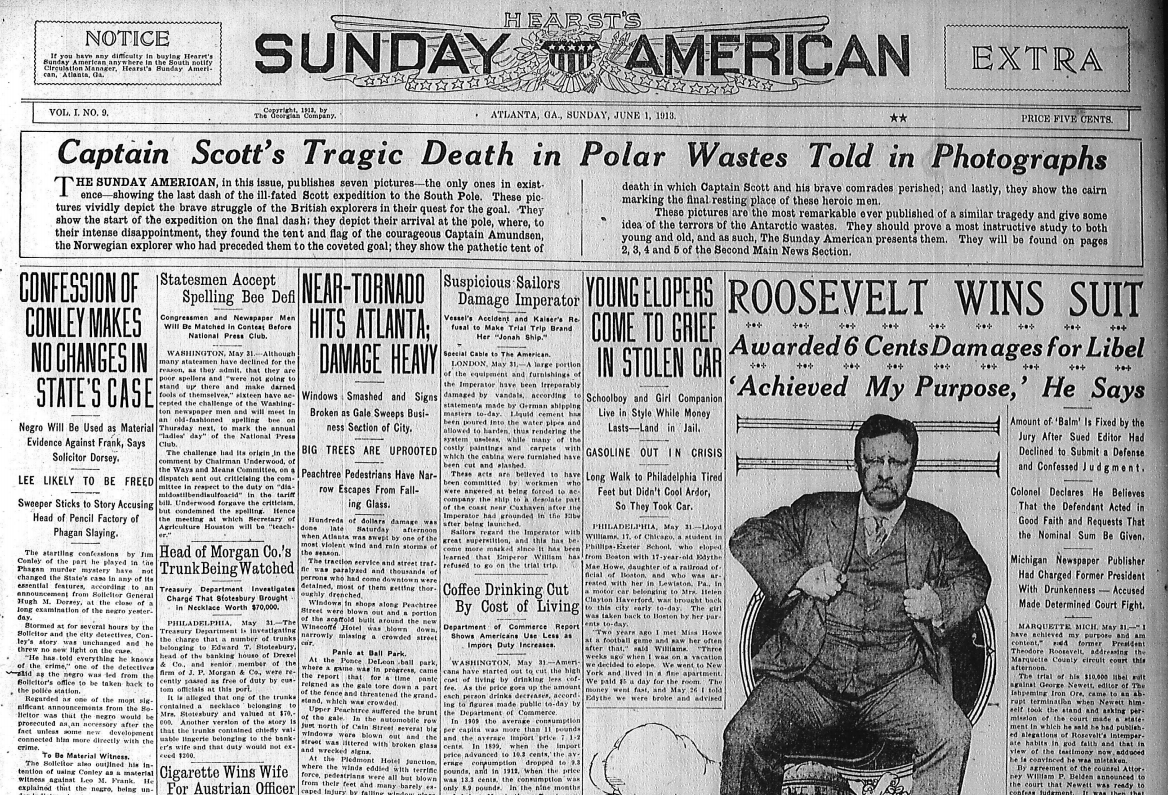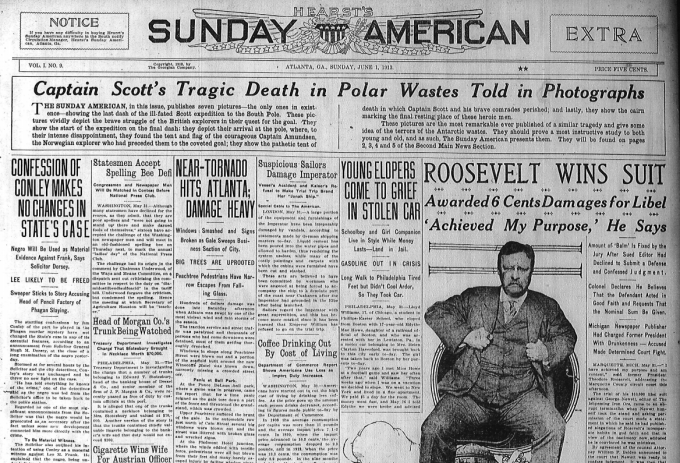Another in our series of new transcriptions of contemporary articles on the Leo Frank case.
Atlanta Georgian
Sunday, June 1st, 1913
Negro Will Be Used as Material Evidence Against Frank, Says Solicitor Dorsey
LEE LIKELY TO BE FREED
Sweeper Sticks to Story Accusing Head of Pencil Factory of Phagan Slaying.
The startling confessions by Jim Conley of the part he played in the Phagan murder mystery have not changed the State’s case in any of its essential features, according to an announcement from Solicitor General Hugh M. Dorsey, at the close of a long examination of the negro yesterday.
Stormed at for several hours by the Solicitor and the city detectives, Conley’s story was unchanged and he threw no new light on the case.
“He has told everything he knows of the crime,” one of the detectives said as the negro was led from the Solicitor’s office to be taken back to the police station.
Regarded as one of the most significant announcements from the Solicitor was that the negro would be prosecuted as an accessory after the fact unless some new development connected him more directly with the crime.
To Be Material Witness.
The Solicitor also outlined his intention of using Conley as a material witness against Leo M. Frank. He explained that the negro, being under indictment as an accessory, would in no way interfere with his being used as a witness.
When the Grand Jury meets next Friday it is more than likely it will take some action on the bill of indictment drawn at the same time with that of Frank, charging Newt Lee, the night watchman, with the murder.
Developments since the indictment was drawn have pretty clearly eliminated Lee from the case, except in the capacity of a witness, and a “no bill” is expected to the indictment.
Conley Grilled for Hours.
For hours Saturday James Conley, negro sweeper, whose sensational confession accuses Superintendent Leo M. Frank of the murder of Mary Phagan, explained in detail to Solicitor General Hugh M. Dorsey the dread mysteries of the National Pencil Factory on April 26, explaining many things that had not been clear to the officials, but sticking tenaciously to the story he told the city detectives.
Conley was taken to the Solicitor’s office at that official’s request and put through a severe cross-examination. With an elaborate diagram, drawn for the Solicitor by Bert Green, a Georgian staff artist, to guide him, the negro traced the various scenes in the factory after the slaying of the girl.
He told just where he first claims to have found her and how he and the superintendent he accuses attempted to dispose of the body. The drama he enacted in the factory Friday for the detectives he re-enacted for the Solicitor in the little room at the court house with the artist’s chart as the stage and his finger as the tracer of tragedy.
Dorsey Well Satisfied.
The Solicitor was well satisfied with the results obtained in the secret conference behind closed doors and certain points that had been vague to him before were made clear.
At Conley’s own request, through William Smith, his counsel, the negro was later transferred to the police station. The negro had been so besieged by questioners at the county jail that he asked to be put within the shelter of police headquarters, where he had been closely guarded and where none but policemen had been allowed to interrogate him.
Conley intimated that he had been threatened at the jail, but little credence was put in his ramblings. It was plain that he wanted rest. He had told his story so often—each time, it may be noted, in almost the same words—that he was tired. The police agreed that he had answered enough questions from outsiders and he was moved.
Police Urge New Test.
A determined effort is being made by the police department to bring Frank face to face with his accuser.
The detectives wish to learn how Conley will go through the ordeal of confronting the man he accuses of directing the disposal of the body of Mary Phagan, and dictating the notes that were found by her body.
They desire also to give Frank an opportunity to deny the negro’s story as Conley is repeating it. Frank has been the man of silence in the Tower. He has had nothing to say in regard to the crime to anyone who has sought to talk with him on the subject, unless it was to his most intimate friends who have visited him in his cell.
He still refuses to have anything to say or to have Conley brought to his cell, except by the permission of his attorney, Luther Z. Rosser, and in Mr. Rosser’s presence.
Plan to Ask Rosser.
The detectives propose to take the matter up with Attorney Rosser. They will represent that the case has reached a stage where it is necessary to give Conley’s statement their final test. Conley went over the scene of the crime step by step on Friday and never wavered in his tale involving Frank deeply.
Now it is desired to have him appear before the very man he so strongly accuses and have him repeat the terrible charges. Some believe that if Conley is alone guilty of the crime, this ordeal will be the final straw that will bring about his full confession.
If Attorney Rosser agrees to the plan, the negro will be taken at once to the cell of Frank. Conley is still in an unsettled state from his long three-day grilling by the detectives, and is thought to be just in the frame of mind to break down and make a full confession, if he knows any more about the crime than he already has told.
Silent Regarding the Case.
In the event that the meeting is arranged, it will be the first time that Frank has broken his silence in regard to the case. He may have talked of it to members of his own family but his most intimate friends say that he has played cards with them and conversed freely on the topics of the day as he has read of them in the daily papers, but that he never has discussed the Phagan mystery directly and at length. Some of his friends have been with him every hour of every day since he has been in the cell at the Tower. They have been most loyal to the imprisoned man.
They declare that he never has mentioned the subject to any of the attaches of the jail, except occasionally to the Sheriff himself. And then it was in an almost impersonal manner.
“I do not know who is guilty,” he said, “but whoever he is, he should hang.”
* * *
Atlanta Georgian, June 1st 1913, “Confession of Conley Makes No Changes in State’s Case,” Leo Frank case newspaper article series (Original PDF)

